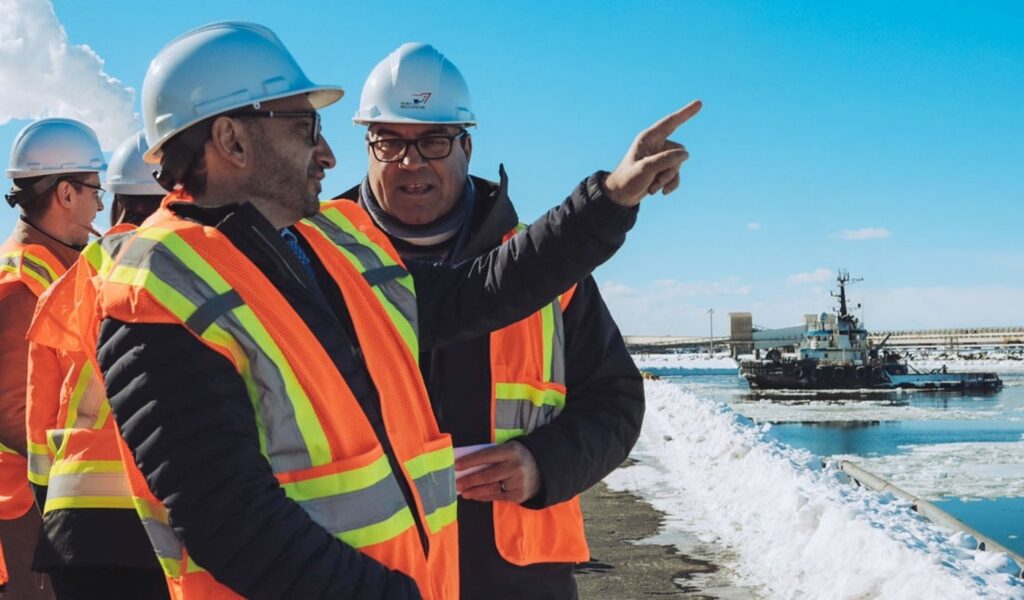
Port of Belledune CEO is pulling for biomass conversion at N.B. power plant
October 6, 2023
By John Chilibeck, Local Journalism Initiative Reporter
 In this file photo, Omar Alghabra, the former federal transport minister, and Port of Belledune CEO Denis Caron speak after a press conference in which Ottawa committed $12.5 million toward port upgrades. Photo: Brunswick News Archive.
In this file photo, Omar Alghabra, the former federal transport minister, and Port of Belledune CEO Denis Caron speak after a press conference in which Ottawa committed $12.5 million toward port upgrades. Photo: Brunswick News Archive. Denis Caron likes to tell people the Port of Belledune has turned a profit every year since he became president and CEO in 2016.
Despite that seven-year string of success, his one big concern remains NB Power’s Belledune Generating Station, the port’s most important customer.
The big plant, which has run for 30 years, is fired by coal. The Trudeau Liberal government in Ottawa has said it must stop using the dirty fossil fuel by 2030 to help Canada hit its climate change targets.
Caron says when he saw tons of New Brunswick-made wood pellets going through the port for export, it got him thinking. Those “white” wood pellets as they’re called in the industry, manufactured from New Brunswick forests, were being shipped to the United Kingdom to help a fossil fuel-fired power plant reduce its carbon dioxide emissions.
“I kept saying to myself, geez, we must be missing the boat on something here,” Caron told New Brunswick politicians on Wednesday at the legislature’s climate change committee.
By early next year, NB Power is planning to do a conversion study to see if Belledune can be turned into a biofuel plant. The pellets would be manufactured from the remnants left on the forest floor when wood-cutting companies go through and chop for pulp or timber. Many of these companies leave the tree limbs and tops by the wayside, remnants that could be scooped up and turned into pellets.
But the needs would be enormous. As it stands, every year four suppliers ship up to 500,000 metric tonnes of pellets through the port, which is the biggest exporter of the product on the country’s east coast. NB Power would require 700,000 metric tonnes of a slightly different variety of pellet yearly to feed its power plant.
“It provides opportunity, but it has to be done in a sustainable way,” Caron said. “The beauty of being a port is we can also import those pellets from somewhere else. So we have that ability and because the power station is next door to us, hopefully beyond 2030, we can continue to generate electricity, albeit with renewable energy, and not have a stranded asset.”
The executive spent 30 years in Fredericton, many of them as a deputy minister, before returning to his home in the north. He said it would be a shame for NB Power to lose the plant, which is worth more than $2 billion.
“We are planning a test burn in the spring of next year with that type of material to see if it works,” he said.
Earlier in his presentation, Caron listed the loss of industrial heavyweights in northern New Brunswick over the last two decades, including Bathurst Consolidated Mill, Brunswick Mine, to name a few. Those closures led to huge job losses and economic downturn, but they also lessened New Brunswick’s carbon footprint immensely. Today, New Brunswick is still one of the worst provinces in Canada for greenhouse gas emissions per person, something the port is trying to change by marketing itself as Canada’s Green Energy Hub, with ambitious plans for hydrogen production, small modular reactors and wind and solar production.
The planned conversion of Belledune comes just as demand for electricity in New Brunswick is growing. NB Power’s CEO Lori Clark told Brunswick News on Tuesday that her organization predicts New Brunswickers will use four per cent more electricity next year.
But Caron doesn’t want NB Power to be the only electricity player in the province. He recommended to the politicians that the Electricity Act should be updated to end the utility’s monopoly on power generation and allow private producers to sell large amounts of electricity into the grid.
“If the demand is there for more energy, then the private sector could make those investments, instead of NB Power,” he said. “We all know the fiscal constraints NB Power faces. So there’s an ability for, let’s say, wind energy to be produced by the private sector.”
John Chilibeck is a Local Journalism Initiative Reporter for The Daily Gleaner.
Print this page